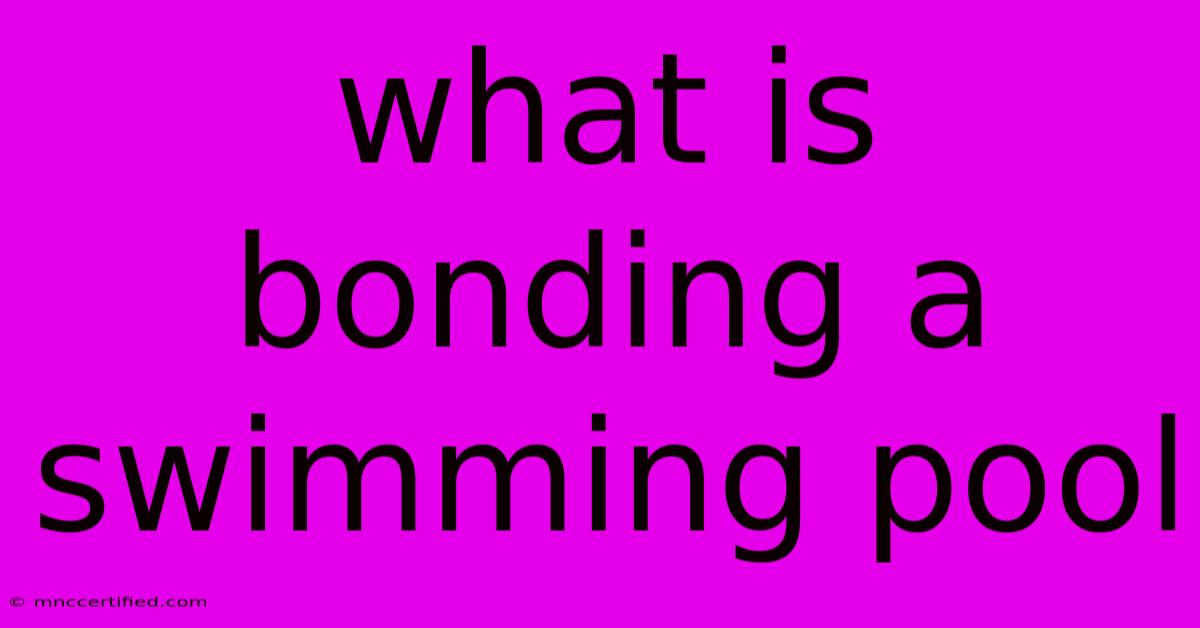What Is Bonding A Swimming Pool

Table of Contents
What is Bonding a Swimming Pool? Ensuring Safety and Preventing Accidents
Swimming pool bonding is a crucial safety measure often overlooked by homeowners. It's not just about aesthetics; it's about preventing potentially fatal electrical shocks. This comprehensive guide explains what pool bonding is, why it's essential, how it's done, and what happens if it's not properly implemented.
Understanding the Risks: Why Bond Your Pool?
Electrical hazards around swimming pools are a serious concern. A faulty underwater light, a malfunctioning pump, or even a stray wire can become energized, creating a lethal risk to anyone entering the water. This is where bonding plays a vital role.
Pool bonding is the process of connecting all metallic parts of your pool and its surrounding equipment to create a single, electrically continuous system. This system is then grounded, ensuring that if a fault occurs, the electricity is safely channeled to the earth, preventing dangerous voltage buildup.
Key Components Requiring Bonding:
- Pool Shell: The metallic structure of the pool itself (if metal).
- Pool Equipment: This includes pumps, filters, heaters, and other metallic components.
- Lighting Fixtures: Underwater lights are a significant source of potential electrical hazards.
- Metal Ladders and Rails: Any metallic parts within or around the pool.
- Handrails and Fencing (if metallic): These should also be included in the bonding system.
How Pool Bonding Works: A Simple Explanation
Imagine a network of interconnected wires. Each metallic component of your pool is connected to this network using bonding wires. These wires act as a pathway for electricity. If a fault occurs in any of the connected equipment, the electrical current is diverted through the bonding system and safely grounded, thus eliminating the risk of electrical shock. The grounding rod is the final link, ensuring the current safely passes into the earth.
The Importance of Proper Grounding:
Proper grounding is critical. It provides the final pathway for the electricity to flow safely away from the pool and its surroundings. Without effective grounding, the bonding system is useless and the risk of shock remains.
The Pool Bonding Process: A Step-by-Step Guide (For Professionals)
Note: Pool bonding is a complex process that should only be carried out by qualified and licensed electricians. Improper bonding can be dangerous and ineffective. This section provides a general overview for informational purposes only.
- Identify all metallic components: This requires a thorough inspection of the entire pool area.
- Select appropriate bonding wires: These should be heavy-gauge, corrosion-resistant copper wires.
- Connect all components: Each metallic part is connected to the bonding system using clamps or connectors.
- Install a grounding electrode: A properly installed grounding rod is essential for effective grounding.
- Testing and Inspection: A qualified electrician should test the bonding system to ensure it's functioning correctly.
Consequences of Inadequate Pool Bonding
Failing to bond your pool, or having an improperly bonded system, creates a significant risk of:
- Electrical Shock: This can lead to serious injury or even death.
- Equipment Damage: Electrical faults can damage pool equipment.
- Liability Issues: If someone is injured due to a lack of proper bonding, you could face legal consequences.
Maintaining Your Pool's Bonding System
Regular inspection of your pool's bonding system is crucial. Look for any signs of corrosion, damage, or loose connections. Have a qualified electrician inspect and test the system annually to ensure continued safety.
Conclusion: Prioritize Safety with Proper Pool Bonding
Pool bonding is not an optional extra; it's a fundamental safety requirement. By ensuring your pool is properly bonded and grounded, you're safeguarding yourself, your family, and your guests from the potentially fatal risks of electrical shock. Always consult with a qualified electrician for professional bonding and regular maintenance. Remember, a safe pool is a happy pool.
Keywords: pool bonding, swimming pool bonding, electrical safety, pool safety, grounding, pool equipment, underwater lights, bonding wires, electrical shock, pool maintenance, safety regulations, pool electrician, prevent electrical shock, pool bonding requirements, bonding system, ground rod, metal pool, bonding clamp.

Thank you for visiting our website wich cover about What Is Bonding A Swimming Pool. We hope the information provided has been useful to you. Feel free to contact us if you have any questions or need further assistance. See you next time and dont miss to bookmark.
Featured Posts
-
Is Marion Bond West Still Alive
Nov 23, 2024
-
Texas Surety Bond Vehicle Title
Nov 23, 2024
-
Acca Bet Plymouth Win Today
Nov 23, 2024
-
Springboks Thrive Erasmuss Low Pressure System
Nov 23, 2024
-
Abuse And Molestation Insurance
Nov 23, 2024